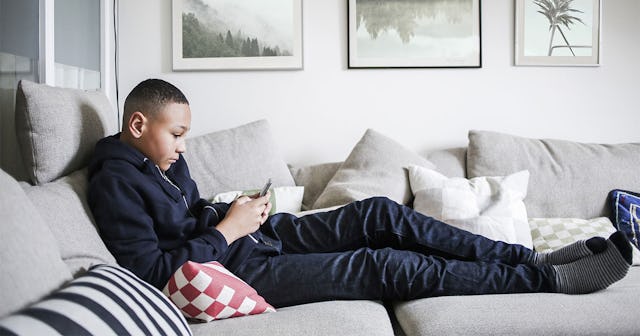I Worry About The Amount Of Screen Time Necessary For My Teen With ADHD

My nagging has gotten out of control since COVID-19 hit. Just as I am adjusting to being both my kids’ parent and their elementary and high school teacher, they’re adjusting too, and it’s hard on all of us. My 13-year-old son hears from me every single day, “Turn off YouTube and get back to work,” or my favorite as of late, “Are you in study hall (which is 80 mins)? Study hall is meant for studying!” I mean, I don’t even take myself seriously anymore, and I am certain he stopped weeks ago.
What my wife and I do take seriously in our household as his moms, is that he and our daughters get too much screen time. We all need a break at the end of the day, and our fallback after playing outside and before dinner is allowing them to have television for an hour, then settling down by playing a fierce game of Guess Who.
I worry every day about what the constant access to the computer or television is doing to the developing brains of my three kids, especially my son, who is both on the autism spectrum and has Attention Deficit-Hyperactivity Disorder (ADHD). By the time his school day ends, I am ready for the computer and all screens to be turned off, even if he’s not.
As a family who works every single day to support one another, being home together has added a new level of understanding of what it means to show up for one another. For my son, this means that we support his need for improved social interactions with others through the array of extracurricular activities we’ve signed him up for. He participates in our church’s children’s choir (via Zoom for now), takes piano lessons, has joined a musical theater group, and runs cross country for the first time this year. In all, he gets out of the house and engages with other people which he needs (heck, we all need).
We’ve signed him up for activities even during a pandemic, because if we do not, it will have detrimental effects on how he formulates and understands healthy interactions with other human beings outside of the screen.
I cannot help but think about my own schooling as I wake my kids up every morning, sleepy-eyed, encourage them to put on real clothes and come down to turn on their laptops from school. When I was in high school, my English teacher rolled in a square television to show us a black and white movie, a Hitchcock film I believe. When I desperately contacted my son’s school counselor asking them to turn off YouTube from my kids’ computer, her response was, “We can’t do that; teachers use it for teaching.” Such a difference from my school days. We couldn’t turn on YouTube and watch anything, and I am better for it. But I digress.
These are the facts: my kid (s) are going to school online and they know how to navigate the internet. They are forced to attend school in ways that I have never needed to. The coronavirus has given us a new way to look at what’s normal for the reality we are living in now, and like it or not, this includes spending an excessive amount of time in front of a screen.
How I’ll survive this school year is a question I ask myself every single day. What has been a godsend is that we’ve been able to keep to the school schedule, and that consistency is essential — especially for a child with ADHD or autism. Assistant Professor of Special Education at Indiana University, Sarah Hurwitz, Ph.D., says in an article for California Life HD, “These kids rely on the predictability of a set schedule. Schedules not only provide cues about what they should be doing, but they can also help reduce stress and anxiety.” In many ways, having a consistent schedule has been our saving grace, for all of us, not just my son.
I look at screen time and my kids’ access to it in a kind of disjointed way. I understand its importance for school; even if I don’t like it, this is what we have. As the parent here, I need to figure out how to take myself out of the equation and look at how screen time can be beneficial, especially for kids like mine.
Randy Kulman, Ph.D., says in Psychology Today, “Many kids with ADHD are impulsive and do not display the best judgment or problem-solving. Keeping kids in the house and engaged, even with screens, is preferable to the risks of infection in the community. Encourage video chat, massively multiplayer online video games with their friends, social media, testing, or even an old-fashioned phone call for children and teens who miss their friends. Remember that they normally spend seven hours a day with their peers in school.”
The internet, as we all know, can be unsafe — and for the teen with ADHD and autism, it can even be a dangerous place. While my role as a mom continues to morph into a hybrid version of my past self, what I am learning is that I too need to adjust to how much screen-time my teen is getting, and get on board sooner rather than later.
This article was originally published on